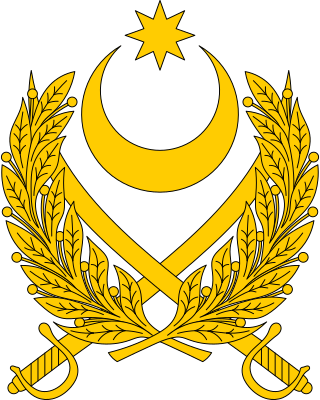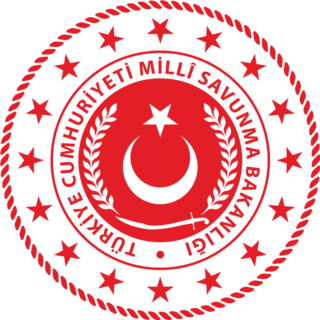 |
|---|
The following is a list of ministers of national defense of Turkey.
| No. | Portrait | Minister | Term of office | Political party | |
|---|---|---|---|---|---|
| 1 |  | Fevzi Çakmak | 3 May 1920 | 5 August 1921 | Independent |
| 2 |  | Refet Bele | 5 August 1921 | 10 January 1922 | Independent |
| 3 |  | Kazım Özalp | 10 January 1922 | 21 November 1924 | Republican People's Party |
| 4 |  | Fethi Okyar | 22 November 1924 | 3 March 1925 | Republican People's Party |
| 5 |  | Recep Peker | 4 March 1925 | 1 November 1927 | Republican People's Party |
| 6 |  | Abdülhalik Renda | 1 November 1927 | 25 December 1930 | Republican People's Party |
| 7 |  | Zekai Apaydın | 29 December 1930 | 1 March 1935 | Republican People's Party |
| (3) |  | Kazım Özalp | 1 March 1935 | 18 January 1939 | Republican People's Party |
| 8 |  | Naci Tınaz | 18 January 1939 | 5 April 1940 | Republican People's Party |
| 9 |  | Saffet Arıkan | 5 April 1940 | 12 November 1941 | Republican People's Party |
| 10 |  | Ali Rıza Artunkal | 12 November 1941 | 7 August 1946 | Republican People's Party |
| 11 |  | Cemil Cahit Toydemir | 7 August 1946 | 5 September 1947 | Republican People's Party |
| 12 |  | Münir Birsel | 5 September 1947 | 5 June 1948 | Republican People's Party |
| — |  | Hasan Saka Acting Minister | 5 June 1948 | 10 June 1948 | Republican People's Party |
| 13 |  | Hüseyin Hüsnü Çakır | 10 June 1948 | 22 May 1950 | Republican People's Party |
| 14 |  | Refik Şevket İnce | 22 May 1950 | 9 March 1951 | Democrat Party |
| 15 |  | Ahmet Hulusi Köymen | 9 March 1951 | 10 December 1952 | Democrat Party |
| 16 |  | Seyfi Kurtbek | 10 December 1952 | 1 November 1953 | Democrat Party |
| 17 |  | Kenan Yılmaz | 1 November 1953 | 17 May 1954 | Democrat Party |
| 18 |  | Ethem Menderes | 17 May 1954 | 15 September 1955 | Democrat Party |
| — |  | Mehmet Fuat Köprülü Acting Minister | 15 September 1955 | 9 December 1955 | Democrat Party |
| — |  | Adnan Menderes Acting Minister | 9 December 1955 | 28 July 1957 | Democrat Party |
| 19 |  | Hasan Şemi Ergin | 28 July 1957 | 19 January 1958 | Democrat Party |
| (18) |  | Ethem Menderes | 19 January 1958 | 27 May 1960 | Democrat Party |
| 20 |  | Cemal Gürsel | 30 May 1960 | 9 June 1960 | Military |
| 21 |  | Hüseyin Ataman | 22 October 1960 | 5 January 1961 | Military |
| 22 |  | Muzaffer Alankuş | 5 January 1961 | 3 July 1961 | Military |
| 23 |  | İlhami Sancar | 20 November 1961 | 20 February 1965 | Republican People's Party |
| 24 |  | Hasan Dinçer | 20 February 1965 | 10 August 1965 | Justice Party |
| 25 |  | Mustafa Hazım Dağlı | 10 August 1965 | 27 October 1965 | Justice Party |
| 26 |  | Ahmet Topaloğlu | 27 October 1965 | 26 March 1971 | Justice Party |
| 27 |  | Ferit Melen | 26 March 1971 | 22 May 1972 | Republican Reliance Party |
| 28 |  | Mehmet İzmen | 22 May 1972 | 15 April 1973 | Justice Party |
| (23) |  | İlhami Sancar | 15 April 1973 | 26 January 1974 | Republican People's Party |
| 29 |  | Hasan Esat Işık | 26 January 1974 | 17 November 1974 | Republican People's Party |
| (23) |  | İlhami Sancar | 17 November 1974 | 31 March 1975 | Republican People's Party |
| (27) |  | Ferit Melen | 31 March 1975 | 21 June 1977 | Republican Reliance Party |
| (29) |  | Hasan Esat Işık | 21 June 1977 | 21 July 1977 | Republican People's Party |
| 30 |  | Sadettin Bilgiç | 21 July 1977 | 18 October 1977 | Justice Party |
| — |  | Cihat Bilgehan Acting Minister | 14 October 1977 | 28 October 1977 | Justice Party |
| 31 |  | Turhan Kapanlı | 1 November 1977 | 5 January 1978 | Justice Party |
| (29) |  | Hasan Esat Işık | 5 January 1978 | 16 January 1979 | Republican People's Party |
| 32 |  | Neşet Akmandor | 16 January 1979 | 12 November 1979 | Republican People's Party |
| 33 |  | Ahmet İhsan Birincioğlu | 12 November 1979 | 12 September 1980 | Justice Party |
| 34 |  | Ümit Haluk Bayülken | 20 September 1980 | 13 December 1983 | Independent |
| 35 |  | Zeki Yavuztürk | 13 December 1983 | 21 December 1987 | Motherland Party |
| 36 |  | Ercan Vuralhan | 21 December 1987 | 30 March 1989 | Motherland Party |
| 37 |  | Safa Giray | 30 March 1989 | 19 October 1990 | Motherland Party |
| — |  | Güneş Taner Acting Minister | 19 October 1990 | 28 October 1990 | Motherland Party |
| 38 |  | Hüsnü Doğan | 28 October 1990 | 22 February 1991 | Motherland Party |
| 39 |  | Mehmet Yazar | 1 March 1991 | 23 June 1991 | Motherland Party |
| 40 |  | Barlas Doğu | 23 June 1991 | 20 November 1991 | Motherland Party |
| 41 |  | Nevzat Ayaz | 20 November 1991 | 24 October 1993 | True Path Party |
| 42 |  | Mehmet Gölhan | 24 October 1993 | 5 October 1995 | True Path Party |
| 43 |  | Vefa Tanır | 5 October 1995 | 6 March 1996 | True Path Party |
| 44 |  | Mahmut Oltan Sungurlu | 6 March 1996 | 28 June 1996 | Motherland Party |
| 45 |  | Turhan Tayan | 28 June 1996 | 30 June 1997 | True Path Party |
| 46 |  | İsmet Sezgin | 30 June 1997 | 11 January 1999 | Democrat Turkey Party |
| 47 |  | Hikmet Sami Türk | 11 January 1999 | 28 May 1999 | Democratic Left Party |
| 48 |  | Sabahattin Çakmakoğlu | 28 May 1999 | 18 November 2002 | Nationalist Movement Party |
| 49 |  | Vecdi Gönül | 18 November 2002 | 6 July 2011 | Justice and Development Party |
| 50 |  | İsmet Yılmaz | 6 July 2011 | 1 July 2015 | Justice and Development Party |
| (49) |  | Vecdi Gönül | 3 July 2015 | 24 November 2015 | Justice and Development Party |
| (50) |  | İsmet Yılmaz | 24 November 2015 | 24 May 2016 | Justice and Development Party |
| 51 |  | Fikri Işık | 24 May 2016 | 19 July 2017 | Justice and Development Party |
| 52 |  | Nurettin Canikli | 19 July 2017 | 10 July 2018 | Justice and Development Party |
| 53 |  | Hulusi Akar | 10 July 2018 | 3 June 2023 | Justice and Development Party |
| 54 |  | Yaşar Güler | 3 June 2023 | Incumbent | Justice and Development Party |













